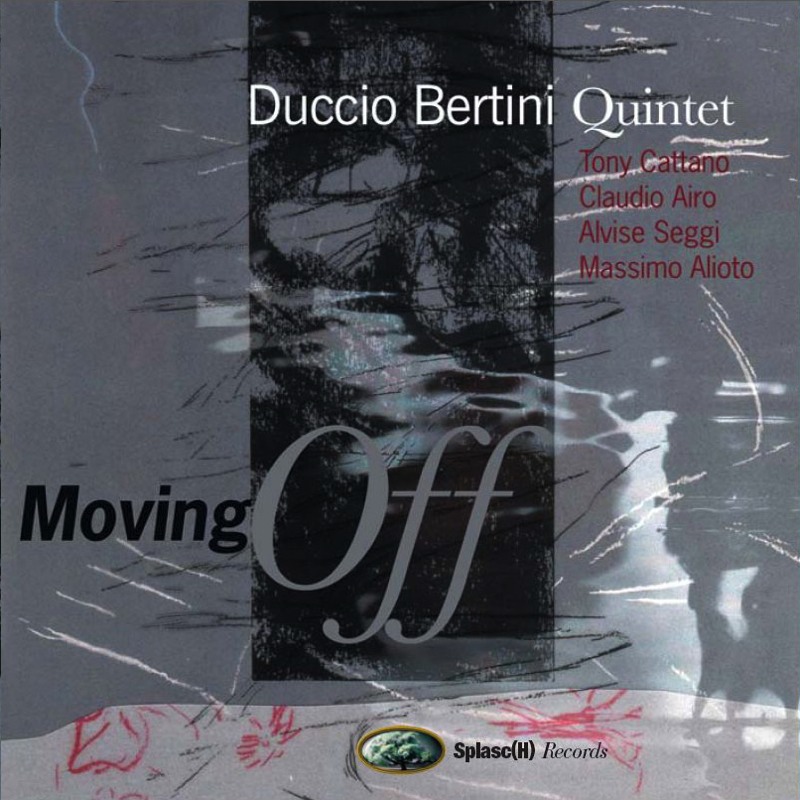Duccio Bertini 5tet “Moving Off” – Splasch Records CDH1539.2
MOVING OFF: (self-)portraits about jazz
A piano introduction… but what is it leading up to? Balanced between clusters and distant echoes of the tango, it is so elusive, ambiguous and equivocal that not even the most intuitive of listeners could work out what is concealed behind that curtain. Then you are taken completely unawares when the stage is filled impertinently with a minor blues (Rush Afternoon), in which the contralto sax and the trombone (harmonised by fourths) build on a Latin rhythm, tracing a theme that would make Horace Silver proud. And the same amazement comes back to stimulate your listening again after the inflamed exposition is passed, when the double bass and the trombone are left alone to tell the story, using the dark register they master to teach us how the blues can summarise the past and the future of jazz in a handful of choruses.
That’s how Moving Off starts out: as you listen to its nine compositions, it leaves you in no doubt that the leader Duccio Bertini and his companions have both hard bop and Aaron Copland in their hearts, both the blues and Latin flavours, both Weill and recent jazz, both the avant-garde and the tradition of the rarefied artists from early twentieth-century New Orleans. So while Light Dance still has us in the midst of a refined jazz with a long memory for the modulations used by Coltrane to beautify Central Park West, the musical geography at work in Der Hund (The Dog) also calls other meridians and parallels into play; in the A section, a dog wanders around disconsolately on a lazy, grotesque minor scale made even more bizarre by the clarinet and the trombone with their subdominant harmonisation. The musicians’ inspired improvisations (and also the rhythm section’s accompaniment) fit neatly into this odd visionary framework. The dog seems to appreciate syncopated music: he was probably brought up on something German by Weill.
Meanwhile, Circles is doubly American in inspiration. Benny Goodman meets one of the most prestigious pens to have written American twentieth-century music: Aaron Copland. Somewhere between hints of jazz and the colour of klezmer (they were both Jews and both rather fond of klezmer), the composer wrote a clarinet concerto whose first part sketches an enchanting unlimited landscape; it is the American frontier, by now become a metaphysical expression: it is (as Bernstein would have said) that sense of unlimited space that is the peculiarity of music from the other side of the Atlantic. Bertini does not quote any clarinet melody, but just transposes certain of Copland’s harmonic intuitions that are capable of instilling that utterly evocative sense of endlessness into his composition. But there is more to Circles than just the reassuring figures of those maestros: there is also the personal sparkle of the talented student. The clarinet melody at ample intervals is a touch of class (and of instrumental wizardry) from a man who knows that two subdominants are not only three notes, because if they are played on a clarinet, it will give three rather different timbres back to us (try listening to the second opening phrase). So the theme will not be in black and white, clarinet and trombone (for which a skilful melody is written in counterpoint that emphasises the melodious sixths here and there), but a coloured blend of the many nuances of which this woodwind so inclined to metamorphosis and the brass are capable.Of no lesser interest is Mouthpiece, written by the trombonist Tony Cattano. His breath and wind filter through the mouthpiece, generating tangible music supported by a rollick- ing habanera punctuated by the interventions of the contralto sax. Then comes a distraught atmosphere that would have had Monk overjoyed, hosting a weird theme that crosses two melodies with each other. But even when Moving Off offers more traditional moments, as in the modal fast 1968, the bossa nova Viagem Ao Sul or the closing blues track Blues for Daisy, the level of refinement of the accompaniments and the transport of the improvisations give these items specific weight, too. In conclusion, there’s personality and to spare (by no means an unusual affair in quality jazz) that also shouts out loud and clear in the only standard on this album. Track N° 4 starts by going back over childhood memories, then breaks into a dissonant waltz, with echoes of little marches. Later on, the rhythm section turns out an old New Orleans groove on which the trombone relies to launch into the first chorus. There is no theme as such. And yet in the jazz fan’s memories that series of chords enriched by improvisations reminds you of something… but you have to wait for the end before you recognise the luminous theme of Strollin’: what with the humour and the original treatment of the form, this is ultimately another piece signed by the Duccio Bertini Quintet. Oscar Wilde was right when he pointed out that every portrait painted with passion is always a self-portrait.
Luca Bragalini
Duccio Bertini (alto sax, clarinet), Tony Cattano (trombone), Claudio Airo (piano, fender rodhes), Alvise Seggi (bass),
Massimo Alioto (drums)
All arrangements by Duccio Bertini, expect 8. by Tony Cattano, are published by Senz’h Edizioni Musicali – SIAE
Recorded on 5-6/12/2007 at ArteSono Recording Studio (Udine, Italy)
Sound Engineer: Stefano Amerio

